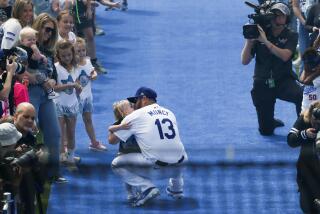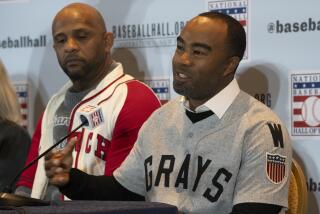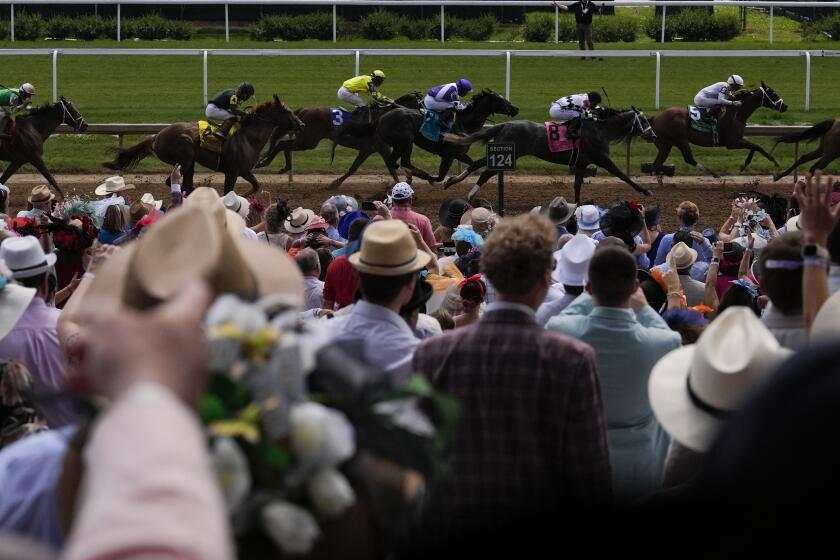Some Famous Firsts: Color-Filled Opening Days of Baseball
- Share via
When Charles Spink, publisher of The Sporting News, left his office on Thursday afternoon, April 16, 1914, to attend a baseball game, he had no idea that he never would return to work. The game in question was Opening Day for the Federal League, the St. Louis Terriers hosting the Indianapolis Hoosiers. The Sporting News had endorsed the elevation of the Federal League to be a third major league, and Spink wanted to be on hand to support St. Louis Owner Eugene Handlan.
The Hoosiers beat the Terriers, 7-3, but after the game Spink complimented Handlan on his team and his new ballpark. That night, Spink was stricken by an intestinal disorder that hospitalized him and then took his life on April 22. The publisher’s mantle thus passed to his son, J.G. Taylor Spink, who had to abbreviate his honeymoon to get to work.
Opening Day was a big deal in baseball by 1914, but it wasn’t always so. When the National League kicked off its inaugural season in 1876, home openers were scattered over six dates spread over almost three weeks. As veteran reporter Fred Lieb wrote in TSN on April 13, 1944, “For some reason, Philadelphia and Boston played the first National League game at the Quaker City April 22, three days before any other clubs. Three days later, April 25, New York, Cincinnati and Louisville opened their gates.” Boston opened its home season April 29, Hartford on May 1, St. Louis on May 5 and Chicago not until May 10.
Within a few years, as Lieb recounted in 1952, “cities and towns made much more of opening day. It was an accepted half holiday, with many stores and business houses closing up shop. In New York, it was an annual custom to parade the old Giants up Broadway in tally-hos, with a liveried trumpeter sitting next to the stove-pipe hatted manager, Jim Mutrie, and giving long blasts from his horn.”
“In Detroit during the ‘80s,” Lieb wrote, “it was an opening-day practice to parade the old National League Detroits and their first game rivals to the old Russell House on Woodward Avenue, and then at a sumptuous mid-day repast stuff the players with turkey, roast beef, ham, Canadian mutton and tankards of beer. A few hours later, these rugged old-timers were ready for the day’s fray.”
Opening Day in Washington, D.C., took on some added glitter when the president of the United States began to attend the game and throw out the ceremonial first pitch. Historians agree that this tradition began with William Howard Taft in 1910, but The Sporting News reported more than a decade before that the honor might have gone to President McKinley. On April 24, 1897, a TSN story noted that “President McKinley closed the doors on the army of office-seekers, who are constantly marching on the White House, long enough to extend the glad hand to the Washington Ball Club. The reception took place on Saturday and the officers and players were presented to the president by Secretary Porter. The president is an admirer of the national game, and an effort is being made to have him attend the opening game with the Brooklyns next Thursday.”
When Taft did make his inaugural toss, The Sporting News saw in it great significance: “His presence on last Thursday in the official capacity of the thrower-out of the first ball was a direct assertion on his part that the professional sport is worthy of the patronage of every class of people in this broad land and that its honesty and cleanliness is considered absolutely beyond reproach.”
Young Taylor Spink, 21 years old in 1910, must have taken these words to heart for a long time. Forty-three years later, he took great and personal umbrage when the Washington Senators did not invite President Eisenhower to throw out the first ball at their 1953 opener until 11 days before game day. Ike had announced his intention to play golf at Augusta National on that date.
Fortunately, the Senators’ debut was postponed by rain, and Eisenhower made it back to Washington to do his duty the next day. Spink scolded the Senators for their tardy invite and a few years later got a photo taken of Ike sitting in Griffith Stadium reading The Sporting News, which over time saw fit to capitalize references to Opening Day.
The Federal League celebrated only two Opening Days before going out of business. But the legacy of the Federals lives on as a result of the antitrust lawsuit brought against Organized Baseball by Federal League club owners as their league went defunct. This is the suit that Kenesaw Landis first heard in U.S. District Court and the same suit, slightly altered, that the U.S. Supreme Court eventually decided in favor of Organized Baseball. As President Clinton warms up for his first 1995 pitch, three weeks later than planned, the antitrust exemption proclaimed in that case is still very much with us.
More to Read
Go beyond the scoreboard
Get the latest on L.A.'s teams in the daily Sports Report newsletter.
You may occasionally receive promotional content from the Los Angeles Times.










